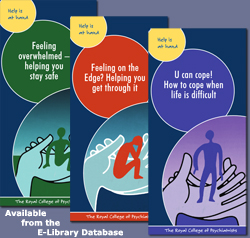The UK has amongst the highest rates of suicide within the European Union.
With the current economic and political climate in this country, suicide kills more than 3 times that of road traffic accidents, and it is not just adults who succumb to the mental health stresses that result in suicidal thoughts; as young people are now suffering more and more from bullying, body image pressures and self-worth crisis.
Now on World Suicide prevention Day, the Open Minds Alliance, working with the College of Psychiatry, has produced support leaflets aimed at helping individuals suffering from suicidal thoughts, to address and understand what they are going through; in an attempt to help prevent self-harming and suicide.
Addressing the stigma around mental health issues, including thoughts of self-harm, is now considered to be one of the best ways of preventing suicide in those suffering mental health trauma which can lead to the ultimate loss of the sufferers life.
- Suicidal thoughts are far more common than people realise. Stigma stops us talking about suicide but talking about it helps break down stigma.
- Stigma means that it can be frightening to admit to yourself that you feel this way and embarrassing to tell another person. Telling someone is the vital first step to getting through it.
In recognition of the rates of suicide in the UK, the Government issued a press release today containing a speech given by Professor Louis Appleby, Chair of National Suicide Prevention Strategy Advisory Group in which he talks about the stigma of suicide, particularly among the young men who are most at risk:
"Visiting the Grand Canyon this summer, I was struck by safety posters reminding us that the hikers who need to be rescued are usually young fit men who look as if they could cope with anything. Our idea of who is vulnerable may not be correct. It made me think that the same is sometimes true of suicide risk.
In England, men are three times more likely to die by suicide than women, and most suicides are in men under 50. The risk is so pervasive that Samaritans and the Campaign Against Living Miserably (CALM) are both running campaigns to help men at risk. While every suicide is a tragedy and a shock, some come without warning, leaving family and friends bewildered.
Signs of suicide risk are often unclear: they may be oblique, ambiguous and difficult to interpret. Some people facing a suicidal crisis may not appear obviously distressed. Others will show changes in behaviour, but perhaps not what people around them expect to see. Teenagers may become withdrawn, spending increasing amounts of time alone in their rooms, perhaps online. Men may become irritable or drink more than usual.
 Vigilance when men we know are facing problems can be vital, even when they look as if they are coping, like the men in the Grand Canyon posters. It is usually a combination of factors that lead to suicide - debt, living alone, bereavement, bullying and family breakdown can all play a part. Often the final trigger does not look too serious on its own but against a background of other problems it can be hard to bear.
Vigilance when men we know are facing problems can be vital, even when they look as if they are coping, like the men in the Grand Canyon posters. It is usually a combination of factors that lead to suicide - debt, living alone, bereavement, bullying and family breakdown can all play a part. Often the final trigger does not look too serious on its own but against a background of other problems it can be hard to bear.
Even when it is clear to relatives and friends that something is seriously wrong, they may be afraid to intervene in case they make matters worse, damage their relationship or even increase the risk of suicide. While asking about suicide can be uncomfortable, it may save a life. And asking about suicide will never put the idea into a person’s head - they may well be relieved that someone realises how bad they feel.
Although suicide and attempted suicide were decriminalised in 1961, the stigma surrounding the subject can discourage people from talking about suicidal thoughts. Some fear they will be labelled as weak, sinful or selfish if they own up to thinking about suicide - and being afraid or ashamed to talk about it may deter them from seeking the treatment they need.
This is why the theme for this year’s World Suicide Prevention Day on September 10 is Stigma: A Major Barrier for Suicide Prevention.
Suicide is the leading cause of death in young men but we can all play a part in bringing the tragic figures down. So be alert if someone you know is going through a difficult time, remember you can save a life by asking the difficult question about suicide. And don’t be convinced that they are fine even if they say they are."
Last year on World Suicide Prevention Day the Department of Health published the ‘Suicide Prevention Strategy for England’ which can also be downloaded from the E-Library Database
Today the Samaritans are marking World Suicide Prevention Day by calling on society to stop expecting men to conform to the traditional view that “real men” should not need to seek help.
Stigma as a major barrier to suicide prevention is a key theme for this year. The expectations society has of men contributes to the fact that men are three times more likely to take their own lives than women.
In 2011 4,552 men died by suicide. Those most affected were men in their 30s, 40s and 50s from lower socio-economic groups.
Research carried out by Samaritans, Men and Suicide: Why it’s a social issue, shows that men tend to compare themselves to a masculine “gold standard”.
This standard often expresses itself in a need to be powerful, successful and above all, in control. Not meeting the standard can lead to a sense of shame and defeat.
Men are more likely to use alcohol and drugs when they cannot cope, as opposed to more formal emotional support such as seeking help or talking to people.
 Samaritans have recommended that society needs to move away from blaming men for not being like women and remove the barriers to men engaging with services.
Samaritans have recommended that society needs to move away from blaming men for not being like women and remove the barriers to men engaging with services.
Many of these issues were raised in the recent BBC Three documentary Football's Suicide Secret, which revealed a dark underside to the “Beautiful Game”.
The programme was presented by the Chairman of the Professional Footballer’s Association, Clarke Carlisle, who disclosed that he tried to take his own life when he was a young player with Queen’s Park Rangers.
In an interview about the programme Clarke summed up what is needed to help men with suicidal feelings: “A huge part of the solution is the ability to verbalise your fears…and having that trusting person there not to take advantage of your vulnerability.”
Catherine Johnstone, Samaritans’ Chief Executive Officer said:
"The pressure placed upon men to behave in ways that fit with the traditional masculine role contributes to the higher rate of suicide among men and is also one of the major barriers to men seeking help.
We must change our views of what it is to be a ‘real man’, but also acknowledge that men are different to women and design services to meet their needs."
Care and Support Minister Norman Lamb said:
“Losing a loved one to suicide is a tragedy and we are committed to reducing deaths from suicide and improving mental health across the country.
Last year, we refreshed the Suicide Prevention Strategy and published a Call to Action, led by the Samaritans, targeting those most at risk by providing the right interventions at the right time.
We are investing £1.5 million into research into suicides and how we can prevent them. Effective suicide prevention requires effort from us all – not only in the State but private and voluntary sectors too.
I am passionate about this issue and I am absolutely determined to do what I can to help reduce stigma and improve the mental wellbeing of everyone in our society – especially the most vulnerable.”
Samaritans is running a national campaign, We’re in your corner, targeting men at high risk of suicide, and are asking people to join the debate on Twitter and sharing how they cope with stress: @samaritans #WSPD
Source: Samaritans / Gov.UK / Open Minds Alliance
If you need to talk, you can call Samaritans at any time of day or night: 08457 90 90 90



 Samaritans have recommended that society needs to move away from blaming men for not being like women and remove the barriers to men engaging with services.
Samaritans have recommended that society needs to move away from blaming men for not being like women and remove the barriers to men engaging with services.